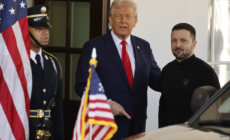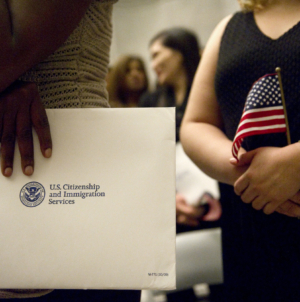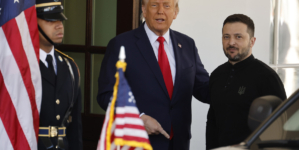-
US Immigration Backlog Hits All-Time High - 27 mins ago
-
South Korea Holds Its Chin Up as Trump Wields Tariff Threat - 28 mins ago
-
Couple Order ‘Non-Alcoholic’ Wine at Restaurant in Europe—Doesn’t Go Well - about 1 hour ago
-
5 Israeli Soldiers Killed in Gaza, Military Says - about 1 hour ago
-
Donald Trump Sending More Weapons to Ukraine: What We Know - 2 hours ago
-
What to Know About P.O.W.s in Myanmar’s Brutal Civil War - 2 hours ago
-
South Africa Reacts to Trump Tariffs News - 2 hours ago
-
The Brothers Who Came Face to Face in Myanmar’s War - 3 hours ago
-
Club World Cup Futures Odds, Best Bets: PSG Favorites Entering Semifinals - 3 hours ago
-
Caleb Williams Is Already Better Than $55 Million QB, Says NFL Analyst - 3 hours ago
List of Products Exempt From Trump Tariffs Including Smartphones, Laptops
The Trump administration has issued a temporary exemption for a wide range of electronics—including smartphones and laptops—from sweeping tariffs, offering relief to tech companies and consumers amid escalating trade tensions with China.
Why It Matters
The U.S. Customs and Border Protection (CBP) updated its tariff guidelines Friday night to list 20 product categories exempt from the “reciprocal” tariffs introduced under Executive Order 14257.
What To Know
The exemptions, effective retroactively from April 5, apply to goods such as automatic data processing machines, semiconductors, and flat-panel displays.
“These products are subject to the existing 20% Fentanyl Tariffs, and they are just moving to a different Tariff ‘bucket,'” Trump wrote on Truth Social. “We are taking a look at Semiconductors and the WHOLE ELECTRONICS SUPPLY CHAIN in the upcoming National Security Tariff Investigations.”
The White House confirmed that tariffs collected after April 5 on these items will be refunded through standard Customs procedures (White House Memorandum). Trump and his officials have insisted the relief is temporary (USA Today), with new semiconductor-focused tariffs expected within months.

Pool via AP
List of Products Exempt From Trump Tariffs
The following product categories are included in the Trump administration’s exemption list from the reciprocal tariffs, as outlined in official Customs and White House documentation:
Laptops and Desktop Computers
This category refers to HTSUS code 8471, which covers “automatic data processing machines and units thereof”—a classification that includes laptops and desktop computers, as well as disc drives and processing equipment.
HTSUS stands for the Harmonized Tariff Schedule of the United States and is the primary resource for determining duty classifications for goods imported into the U.S.
Computer Components and Storage Devices
- Parts and accessories for computers (8473.30)
- Solid-state drives (SSDs) and other non-volatile storage devices (8523.51.00)
- Flat-panel display modules used in monitors and mobile devices (8524)
Smartphones and Communication Devices
- Smartphones (8517.13.00)
- Routers, switches, and other data transmission equipment (8517.62.00)
- Flat-panel displays intended for computer integration (8528.52.00)
Semiconductors and Electronics
- Semiconductor manufacturing equipment (8486)
- Diodes and transistors, including optical isolators and thyristors (8541 series)
- Unmounted chips, dice, and wafers (8541.29.00)
- Semiconductor-based transducers (8541.51.00)
- Electronic integrated circuits and related parts (8542)
These exemptions target tech sectors with limited domestic production and high import dependency. The move comes as China responds to U.S. tariffs with its own retaliatory measures, intensifying trade tensions.
What People Are Saying
“This is the dream scenario for tech investors,” Dan Ives, global head of technology research at Wedbush Securities, told CNBC. “Smartphones, chips being excluded is a game-changer scenario when it comes to China tariffs.”
Vice President JD Vance posted on X, formerly Twitter: “There is a category of D.C. insider who wants to fight an actual war with China, but also wants China to manufacture much of our critical supply. This is insane. President Trump wants peace, but also wants fair trade and more self-reliance for the American economy.”
What Happens Next
Market analysts warn the temporary exemptions do little to resolve long-term uncertainty over U.S. tariff policy. Trump’s administration has indicated further action is coming, with new duties likely to target the semiconductor and pharmaceutical sectors.
Source link



















